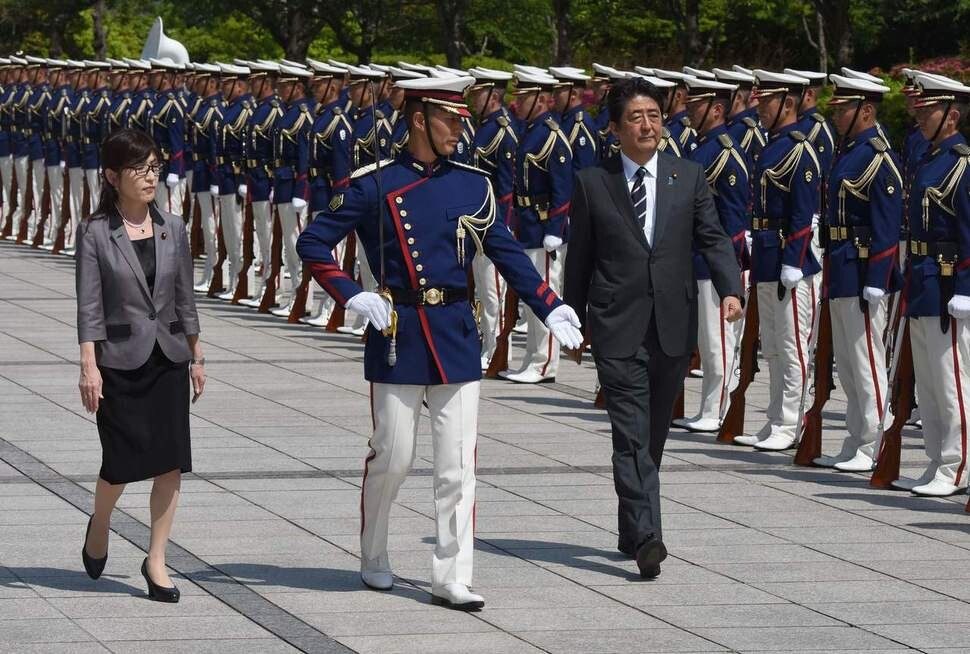hankyoreh
Links to other country sites 다른 나라 사이트 링크
UN Rapporteur criticizes Japanese gov’t’s interference in teaching of comfort women issue

A UN draft report on freedom of expression in Japan is demanding corrective action for what it describes as the government’s excessive interference in textbook treatments of the comfort women issue.
It’s the latest in a series of frictions between the UN, which has repeatedly expressed concerned about historical distortions and human rights issues, and Japan, which has disputed the claims.
The Sankei Shimbun newspaper reported on May 30 that the draft of a report scheduled for presentation to the UN Human Rights Council next month by Special Rapporteur for Freedom of Expression David Kaye includes a recommendation that Tokyo refrain from interfering in interpretations of historical facts in connection with education on the comfort women and other issues.
In the draft report, Kaye noted instances of accounts about the comfort women by outside experts being edited in or deleted from middle school textbooks, as well as actual references to the comfort women being accompanied by the government’s position that they were not forcibly drafted. Kaye recommended a review of the current authorization method, and in particular consideration on how the textbook authorization examination committee can be protected from government influence.
The report also noted what it called an infringement of the rights of journalist Takashi Uemura, whose article on the comfort women issue was acknowledged as misreported and retracted by the Asahi Shimbun newspaper.
In addition to the comfort women issue, the draft report expressed concerns about a wide range of other freedom of expression restrictions in Japan. The Japanese government’s statements about potentially being able to suspend broadcasters “lacking political fairness” in accordance with the Broadcast Act could be taken as a form of intimidation to restrict media activity, it said. In particular, it mentioned serious concerns about a 2012 Liberal Democratic Party (LDP) amendment of the Constitution. The amendment in question removed Article 97 stating basic human rights to be “for all time inviolate,” a move Kaye said weakened human rights protections in Japan.
Reports by UN Special Rapporteurs can have a serious impact on international opinion. The Japanese government is scheduled to issue a rebuttal aimed at having the draft’s content altered.
Chief Cabinet Secretary Yoshihide Suga said Tokyo was “in discussions” with Kaye about the report.
“Obviously, the government is going to dispute what it should raise objections to,” Suga said.
The Japanese government and UN have butted heads numerous times recently on human rights and history. The issues raised by the UN have gone beyond the comfort women issue to address various right-wing policies by the administration of Prime Minister Shinzo Abe. On May 12, the UN Committee against Torture recommended amendment of Japan’s Dec. 2015 agreement with South Korea on the comfort women issue, which it said failed “to provide redress and reparation, including compensation and the means for as full rehabilitation as possible as well as the right to truth and assurances of non-repetition.” The Japanese government countered that the agreement had been praised by then-UN Secretary-General Ban Ki-moon.
On May 18, UN Special Rapporteur for Privacy Rights Joseph Cannataci sent a letter to Abe criticizing Japan’s attempts to enact anti-conspiracy legislation, prompting Tokyo to send a written protest the following day. The anti-conspiracy laws in question would allow for punishment for activities in the preliminary stages even for crimes that are not actually committed.
By Cho Ki-weon, Tokyo correspondent
Please direct questions or comments to [english@hani.co.kr]

Editorial・opinion
![[Column] Season 2 of special prosecutor probe may be coming to Korea soon [Column] Season 2 of special prosecutor probe may be coming to Korea soon](https://flexible.img.hani.co.kr/flexible/normal/500/300/imgdb/original/2024/0426/3317141030699447.jpg) [Column] Season 2 of special prosecutor probe may be coming to Korea soon
[Column] Season 2 of special prosecutor probe may be coming to Korea soon![[Column] Park Geun-hye déjà vu in Yoon Suk-yeol [Column] Park Geun-hye déjà vu in Yoon Suk-yeol](https://flexible.img.hani.co.kr/flexible/normal/500/300/imgdb/original/2024/0424/651713945113788.jpg) [Column] Park Geun-hye déjà vu in Yoon Suk-yeol
[Column] Park Geun-hye déjà vu in Yoon Suk-yeol- [Editorial] New weight of N. Korea’s nuclear threats makes dialogue all the more urgent
- [Guest essay] The real reason Korea’s new right wants to dub Rhee a founding father
- [Column] ‘Choson’: Is it time we start referring to N. Korea in its own terms?
- [Editorial] Japan’s rewriting of history with Korea has gone too far
- [Column] The president’s questionable capacity for dialogue
- [Column] Are chaebol firms just pizza pies for families to divvy up as they please?
- [Column] Has Korea, too, crossed the Rubicon on China?
- [Correspondent’s column] In Japan’s alliance with US, echoes of its past alliances with UK
Most viewed articles
- 1[Column] Season 2 of special prosecutor probe may be coming to Korea soon
- 2‘We must say no’: Seoul defense chief on Korean, USFK involvement in hypothetical Taiwan crisis
- 3Is N. Korea threatening to test nukes in response to possible new US-led sanctions body?
- 4Division commander ordered troops to enter raging flood waters before Marine died, survivor says
- 5Amnesty notes ‘erosion’ of freedom of expression in Korea in annual human rights report
- 6Is Japan about to snatch control of Line messenger from Korea’s Naver?
- 7No good, very bad game for Korea puts it out of Olympics for first time since 1988
- 8[Editorial] Korea’s surprise Q1 growth requires objective assessment, not blind fanfare
- 9N. Korean delegation’s trip to Iran shows how Pyongyang is leveraging ties with Moscow
- 10Korea’s 1.3% growth in Q1 signals ‘textbook’ return to growth, says government